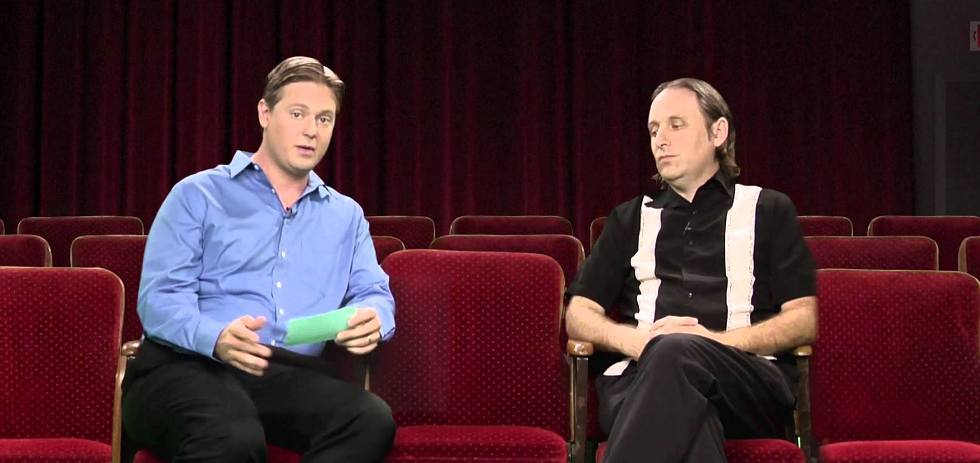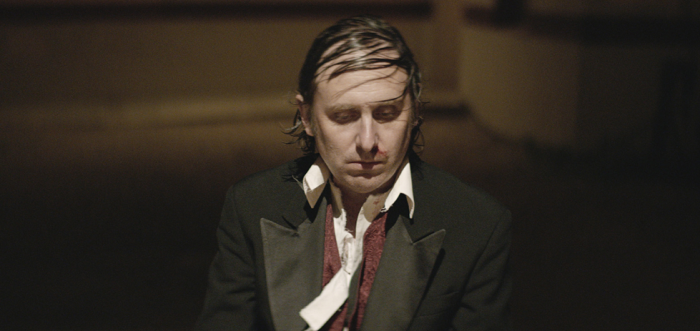Darwin-born, US-based comedian Gregg Turkington is best known via his alter-ego, Neil Hamburger; a greasy-haired, sweaty, tuxedoed insult comic, who recites his ‘jokes’ in a blood-curdling whine and is prone to belabouring the punchlines with sputtering coughs and incantatory repetitions of the “why” and “what” of their setups. A typical Hamburger performance invites laughter, discomfort or outright hostility, usually depending on audience foreknowledge. There’s an element of performance art to Neil Hamburger’s shtick, and it’s that aspect that forms the basis of writer/director Rick Alverson’s Entertainment. A star-vehicle of sorts for Turkington, the film sees him playing a touring comedian loosely based on the Hamburger persona, who drifts through a literal and figurative desert in Nevada, as he performs disastrous stand-up sets and struggles offstage to make even basic human connection.
Among his many other projects, Turkington also forms one half of the Adult Swim parody film review program On Cinema, alongside fellow comic Tim Heidecker, who starred in Alverson’s prior feature The Comedy. On the occasion of the Australian home video release of Entertainment, we spoke to Turkington about the film, Neil Hamburger, On Cinema, and the common threads of these projects.
I first heard of Neil Hamburger via posters and street press around Sydney, in the late 90’s/early 00’s, when you were living in Melbourne and touring Australia regularly. The ads we usually accompanied with the tagline ‘world’s worst comedian’, or something to that effect. Were your shows as Neil Hamburger always pitched that way?
I never pitched it that way, but I can see where some people might perceive it that way, because there’s certainly confrontational elements that might lead people to assume it’s the ‘worst’. But on the other hand, to me, the worst would be something like Carrot Top, or something like that. As far as I’m concerned, I go out there and put on the show, and people are laughing and having a good time, so how ‘bad’ is it really? I might not follow the same route that more traditional comedians follow, but you know, I don’t get a lot of people that are asking for refunds. The whole idea was always about putting on an entertaining show, it’s just that it may not be in the manner that people are accustomed to. You may have a delayed reaction with the laughter, I don’t know… It’s definitely something that has been a reference point for people trying to sell the show for many, many years, but that wasn’t a tagline that I had applied to it.
Entertainment plays like an extrapolation of the Neil Hamburger persona, much in the same way that The Comedy was for Tim [Heidecker]’s persona. What were the initial conversations like between you and Rick [Alverson], concerning the project?
He’d seen [a Neil Hamburger performance], and thought that it might make for an interesting feature film. There were certain aspects that he wanted to flesh out and explore deeper, and these were aspects that I had kept secretive over the years. Initially, we had to get on the same page about what this guy’s offstage life would be like, because that was something I had always left to the imagination of the viewer. So we had to figure that out.
Generally speaking, were the visual ideas of the film from Rick, and the character details yours? Or was the process more fluid?
There’s a lot of collaboration going on and a lot of discussion of things. The visual stuff, that more Rick’s department and [cinematographer] Lorenzo Hagerman, though there were certainly a few locations that I’d suggested might look interesting. But those guys are very, very into making things look the way they want them to look, and putting a lot of time and effort into getting things, visually, the way they wanted it to be, and that wasn’t really my department.
Your character’s stage persona isn’t identified as ‘Neil Hamburger’ in the film; was it important that he wouldn’t be identified as such?
We went back and forth on that. But in the end, we decided that if we identified the character as Neil Hamburger it would come with all this baggage right off the bat, and a backstory that people might be familiar with… it made more sense to use Neil Hamburger as a reference, but not necessarily be wedded to the backstory. With that in mind, it made more sense to not specifically name the character as Neil Hamburger.
There’s a scene in the film in which another comedian is telling a joke to your character before he performs, and moments later it’s revealed that he’s auditioning one of the jokes in his stand-up routine on you… it’s such a mortifying scene, for both the character and the viewer, by proxy. Is that something that’s happened to you often?
You know, some people watch the movie and mistakenly assume that it’s a document of what life is like for me on the road, when I’m touring as Neil Hamburger. But that actually is something, yes, you’re right, that actually is something that has happened to me more than once: you’re in some town, in some strange club, and somebody strikes up a conversation. And you might not think you’ve made a new friend, exactly, but you take it at face value and you think they want to talk to you. And then there they are, five minutes later on stage, saying the same thing word-for-word, and you were just being used… it’s pretty ugly. So that’s one thing [from the film] that truly was taken from real life… not like the baby being born on the bathroom floor of a rest area, and that kind of stuff.

There’s a scene involving The Comedian’s jokes being badly translated for two people who don’t speak English, which brings up a recurring theme of the language barrier, and more generally, how language fails. The most—or rather, only—edifying moments of human communication your character experiences are non-verbal, between you and several Hispanic characters. This brought to mind your 1997 ‘live’ album as Neil Hamburger, Left For Dead in Malaysia, which plays with a language barrier for another layer of comedy. Could you talk about this overarching theme of language, both as Neil Hamburger and in Entertainment?
Certainly with the album that I did in Malaysia, [the concept was] that this guy’s done so many shows to audiences who don’t laugh or pay attention to anything he says… then he’s put in the same situation, but it’s because of the language that they’re not laughing or responding, it’s actually almost liberating, because he throws out the material altogether and just starts talking, realising that no one can hear or cares about what he says, which is probably the case when he’s speaking in English anyway. We didn’t exactly replicate anything from that album in the movie, but you do get that one moment when it does seem that somebody is actually on the same page as the comedian in terms of what they’re finding funny, and that’s a many-years-older Hispanic farm worker that I start to joke with.
There’s a scene in Entertainment that actually reminded me of your work with Tim [Heidecker] on On Cinema, in which the tour guide introduces the group to a location from Five Easy Pieces and proceeds to do his take on a ‘classic line’ from in. What do you think it is about film culture in particular that lends itself so well to the kind of parody seen in On Cinema? It’s hard to imagine the setup working as well with a book or record review show.
Movies, you know, are larger than life, and I think people are kinda hypnotised by them and what they’re seeing on the screen. They hold these things in higher regard than sometimes they ought to. Certainly in the case [of the scene] where you’ve got a tour of some oil derricks, pumping up oil from the ground… not necessarily the most scintillating tour you can take. It’s not something that has a lot to do with movies, or with Five Easy Pieces, but this is really the selling point for the people on the tour, was that perhaps this movie with Jack Nicholson that was filmed somewhere in the vicinity of this particular derricks, that that would make the site somehow magical. For me that was one of the funnier scenes in the movie, and it was something Rick came up with. When we were driving around looking at locations, I said to him “this is the area where they shot those opening scenes of Five Easy Pieces”. And the next thing you know, he had written it into the script as this preposterous tour. Although I think the guy we got [to play the tour guide] had actually given similar tours in the area, for real, but Rick had coached him to study up on Five Easy Pieces, and work on a Nicholson impersonation for the scene. [laughs]
You’ve said that On Cinema originated from when you and Tim Heidecker were on the set of The Comedy, in which you had a small role, and you were both riffing together on a parody film review podcast… could you talk about how it ended up growing into what it is now?
Well, although there’s a lot of repetition to On Cinema, and we like that about these characters; that they don’t seem to be able to break out of their horrible habits, and their fights, and the same issues seem to come up again and again. But from a creative point of view, you don’t want to do the same thing over and over. So after we’d made our point of ‘content-free film criticism’, we felt free to take things in a different direction, into the plot and the subtext of what these people are all about, and it’s become a very weird and multi-layered soap opera.
You’ve only started doing press ‘out of character’ for the release of Entertainment, right?
Yeah. I mean, I’ve always avoided talking about this kind of stuff, because I’ve always just wanted to have the stuff out there and let people make what they want of it. I’m not saying that’s the ‘right’ point of view, I just like that… I don’t even know how much longer I’ll do this kind of interview, but it’s been fun, a lot more fun than I expected.
Entertainment is available now on home video via Roadshow Entertainment.
